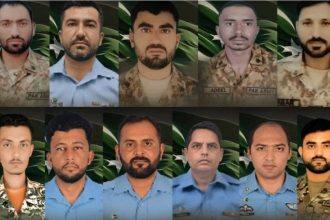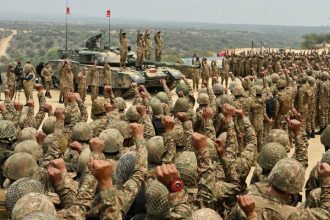The Pakistan Medical and Dental Council — the body that accredits medical colleges, doctors and other medical professionals — has gone through a string of allegations and charges against senior officials.
Corruption allegations and scandals have rocked the body, and not just in the wake of Dr Asim Hussain’s arrest.
Irregularities in the registration of medical colleges and allegations of wrongdoing in the accreditation of doctors have also been levelled in judicial probes of the PMDC’s affairs.
In this special report, Dawn investigates whether the council is experiencing institutional rot, and asks whether the general public can really afford to put blind trust in the health profession anymore.
In 2011, a dental and medical college in Karachi applied for recognition from the Pakistan Medical and Dental Council. Ironically, the request for the recognition, without which no medical institution in Pakistan can offer a degree in medicine, was filed on April 1.
By December the same year, the PMDC approved its case for recognition.
No Pakistani doctor can practice in Pakistan or abroad without being registered with the PMDC and the body registers only those doctors who have studied at a college recognised by the council.
However, two years later, when a judicial commission sent a team to the college, its building was still incomplete.
Many such incidents were reported by the judicial commission — set up under a court order after allegations of embezzlement in the registration of private colleges in 2013 — looking into PMDC’s ‘generosity’ towards new colleges. The commission was headed by former Lahore High Court judge Shabbar Raza Rizvi.
Recommending the de-recognition of the college in Karachi, the commission also said that the hospital attached to the college (where students are supposed to learn how to treat patients) had two wards “but we found them empty except one patient in the male ward”.
It also emerged that when recognition was to be granted, one member of PMDC’s executive committee, Prof Naveed Rashid Qureshi, had himself inserted into the team that was going to inspect the college. He became a member of the team on December 19, 2011, the day before the inspection was to be carried out.
The day after, on December 21, the executive committee approved the recognition of the college.
No wonder those associated with the profession claim that the approval of Pakistan Medical and Dental Council (PMDC) for a medical colleges had become a joke.
According to its own mission statement, PMDC has to “establish a uniform minimum standard of basic and higher qualifications in medicine and dentistry throughout Pakistan”.
The process of obtaining PMDC recognition for a medical college takes months, but in the case of some colleges, it only took a couple of days.
With its new found efficiency, from 2010 to 2013, the PMDC recognised 19 medical and dental colleges.
Five of these colleges were located in Sindh (three in Karachi, and one each in Nawabshah and Mirpurkhas); eight were based in Punjab (two each in Lahore and Sialkot, one each in Faisalabad, Gujranwala, Sahiwal and Gujrat), two each in Islamabad and AJK, one in Quetta and one in Bannu, Khyber Pakhtunkhwa.
The hurried recognition of unsatisfactory institutions started in 2010, when some government officials forwarded 25 such cases to the PMDC and then pushed for their recognition.
The same commission report quoted earlier also examined this incident and found that “the then-registrar Dr Ahmed Nadeem Akbar pointed out to the director general health that the council wanted to limit the establishment of new colleges”.
After Akbar’s objection, the then-ministry of health reduced the number of colleges from 25 to 9 – however, this number later went up to 19. Akbar was eventually removed from the post by the executive committee.
When the report came out, sources in the PMDC claimed that former members of the executive committee had advised medical colleges to approach the courts to delay the matter.
At the time, the PMDC executive committee included Dr Sibtul Hassan, Dr Asim Hussain, Prof. Masood Hameed Khan, Prof. Zubair Khan, Prof. Syed Mohammad Awais and Prof Naveed Rashid Qureshi.
Eventually, the commission recommended that five colleges be de-recognised; but equally importantly, it raised a number of objections on the way in which the other colleges had been given recognition.
For a Lyari-based medical college, the commission noted that when it had applied for recognition, its “faculty was not complete”. Moreover, the college started admissions prior to recognition, a violation overlooked by the PMDC. The college applied for recognition in May 2011 and by December the same year, the executive committee of the PMDC had approved its case.
The strange thing the commission pointed out was the recognition of two medical colleges of Mirpur and Muzafarabad, where the process was completed in a couple of days for both institutions.
The report stated that “the same team (of PMDC) conducted inspections on December 20, 2011 in Mirpur” and the following day in Muzaffarabad.
But it was not just the visiting team that was in such a hurry. “…the inspectors submitted their reports before the executive committee on the date they did the inspection i.e. December 21, the executive committee also held its meeting on the same day and approved the inspectors’ reports.”
In other words, two campuses were visited, reports were prepared, submitted and approved, all during the course of two days.
A medical college in Mirpurkhas stated that PMDC’s executive committee in July 2011 “showed its satisfaction and found sufficient facilities”.
However, when the commission visited the college on June 6, 2013, it “found infrastructure and other facilities in awful condition.”
Criticising the recognition given to a Gujrat-based college, the commission declared that “the whole process has been non-transparent and irregular”.The commission also identified some deficiencies in the colleges based in Gujranwala, Sialkot and Sahiwal but observed that since these were government colleges, they should be allowed to continue – subject to strict vigilance of the PMDC.
The commission noted that the powerful executive committee always overlooked the “outcry of the registrar” against the violations of the rules and procedure.
The judicial commission report is not the only document that has identified problems in the process of recognition.
An audit by the auditor general’s office from 2013 also points out a number of irregularities in the recognition of medical colleges.
The report says that a number of colleges had no working capital or endowment funds and had provided no evidence of a library. Rawal Institute of Health Sciences, Aziz Fatima Medical, Dental College, Faisalabad and Pakistan Red Crescent Medical and Dental College, Lahore were among those that lacked these facilities.
The audit also pointed out that in some cases, the recommendations of the investigation committee were ignored while awarding recognition.
In some cases, the audit report also found that college buildings were under construction at the time of the inspection or the colleges were operating out of rented buildings or its land was not free of legal disputes.
In one case of a college in Karachi, the building had been constructed initially for a rural health centre which was then turned into an eye hospital, then turned into a general hospital.
Then-PMDC president Dr Masood Hameed Khan could not be contacted; he did not respond to text messages either.
Former PMDC legal advisor Raja Saimul Haq Satti told Dawn that the council had given recognition to many public sector medical and dental colleges as well as private ones.
According to him, public sector colleges were not set up for profit and were meant to serve the general public; “therefore any lapse in the recognition of public sector colleges may be treated as being in ‘good faith’,” he said.
“The commission in the report also noted this and allowed the public sector colleges to run under the strict supervision of the PMDC,” he said, adding that the judicial commission also suggested several remedial measures for bringing the education of the newly registered medical colleges up to par.
Satti said that some colleges had challenged the findings of the commission in the Sindh High Court (SHC) while four had filed petitions in the Islamabad High Court (IHC) and he could not comment on the matter.
Retired Brigadier Hafeezuddin Ahmed Siddiqui, the PMDC registrar, told Dawn that some of the colleges recognised at that time are functioning very well.
He, however, said that the incumbent chairman retired Major General Azhar Mehmood Kayani would re-evaluate all colleges against whom PMDC had received complaints and a 14-member inspection team had been constituted for this purpose.
After a thorough inspection, the colleges could be asked to “stop admissions, improve the quality and infrastructure or they be reprimanded and their recognition be withheld or annulled”.If their institution is not recognised by the PMDC, many foreign-qualified doctors cannot practice in Pakistan unless they clear the NEB examination.
Earlier this year, the PMDC supposedly allowed ‘ineligible’ candidates to practice medicine by distorting the results of a mandatory examination.
This was observed in a report of a three member commission constituted under the direction of the IHC; the commission observed “serious distortion in the results of the National Examination Board (NEB) examination held in February 2015”.
According to the report, “some candidates were shown as passed [who] did not even sit for the examination”.
Sections 15 and 19 of the PMDC Ordinance “require the council to register a person holding a medical and dental qualification respectively granted by an institution outside Pakistan only after testing his or her skills and knowledge through an examination held by …” the NEB.
After this ordinance was promulgated, a number of doctors holding degrees from institutions in China and Russia approached the IHC; they wanted the court to order the PMDC to register them despite the fact that their colleges were not recognised by the PMDC. Unless they are registered with the PMDC, their degrees have no worth as they cannot practice in Pakistan.
In their petitions, these doctors highlighted some irregularities on the part of PMDC during the NEB exams.
Since 2010, the board has conducted 19 exams. The first two were conducted at the University of Lahore in 2010. Six examinations were held in the Khyber Medical University in 2012, 2013 and 2014 respectively and two in 2013 at Liaquat University of Medical Sciences, Jamshoro, in 2013. Nine examinations were held at the Dow University of Health Sciences in 2011, 2012, 2014 and 2015 respectively.
The report noted that the success rate of exams held in February 2015 conducted in Dow University was quite high – 52 per cent – whereas the results of the exams conducted in the universities in other parts of the country was as low as 17 per cent.
The vice chancellor of Dow University, Dr Masood Hameed, was also the president of the PMDC at the time the exam was conducted.
Subsequently, the IHC on February 6, 2015, constituted a three-member commission consisting of Dr Syed Fazle Hadi, Dr Sania Nishtar and Ejaz Rahim. The commission submitted its report to the IHC on May 15.
On June 5, the Ministry of National Health Services, Regulations and Coordination, referring to the commission’s report, directed the PMDC registrar and the official in charge of the NEB, to send all relevant documents related to the said examination.
Initially, the matter was probed by the PMDC and the initial inquiry confirmed the allegations.
According to the commission’s report “a lenient view was taken by the university authorities and those responsible were let off [with] a mere warning.”
It also emerged that the Dow vice chancellor first supervised the exam and then later decided to spare the ‘culprits’ by letting them off with only a warning.
Despite this, the PMDC once again allowed Dow to hold the NEB examination in April 2015.
PMDC’s critics claim that those involved in this exam could earn millions of rupees.
They claimed that foreign qualified doctors are willing to pay Rs1.5 to Rs2million for their registration.
But former PMDC legal advisor Raja Saimul Haq Satti said PMDC initiated the NEB examination under its statute to register medical practitioners who had obtained medical degrees from foreign institutions which are not recognised by the council.
He said that there were a number of foreign medical colleges in different countries in the recognised colleges list of the PMDC and their graduates were registered by the PMDC without any exams.
The Supreme Court held that the medical graduates of the unrecognised foreign universities should pass a test to get PMDC’s registration, he said.
According to him, the council held inquiries into complaints and allegations while some students approached the IHC to challenge the NEB examination. The court then formed a commission to probe the allegations. “The matter is still subjudice before the IHC.”
PMDC registrar retired Brigadier Hafeezuddin Ahmed Siddiqui stated that that because of a growing number of complaints, the PMDC had decided to play a minimal role in the NEB examination in the future.
According to him, the last NEB exams were held at the University of Health Sciences (UHS) in Lahore, where question papers were put together by the UHS itself, which also conducted the exams and marked the answer sheets; PMDC only provided logistical support, he said.
Naqash Nasir, 27, had dreamt of becoming a doctor since he was a young boy.
In 2009, he saw PMDC advertisements stating that as many as seven medical universities in China had been registered with the council; this meant that graduates of these colleges would not have to clear the NEB test in Pakistan.
Under PMDC rules, students who study for MBBS in languages other than English have to pass the NEB.
Based on multiple-choice and short questions, the eight-hour long exam is conducted by the PMDC and is aimed at judging the candidate’s mastery of the subject.
The decision was taken because of complaints that doctors, who studied in languages other than English, faced problems in treating patients. In addition, the test was aimed at judging the capabilities of doctors to address concerns about uneven quality of education across colleges and universities.
“It was not easy to convince my father to put together the money as he is a trader – a clothes shop owner – and he believed in learning the business instead of going for higher studies. He also had six children to feed and educate. But because I had my heart set on it, he put together five million rupees to send me to Xian Jiaotong Medical University in China,” he said.
“It was very difficult to stay away from my family in an alien culture, but I felt the hardship was worth it. I completed my MBBS in 2014,” Naqash told Dawn.
“However, after I returned, I learnt that the degree that I had earned after a struggle of over five years, had no worth. I was told by PMDC that in 2012, an act of parliament made it mandatory for all foreign graduates to clear NEB,” he said.
“But I went to China after confirming that the university was registered with PMDC and that I wouldn’t have to clear the NEB, so why should I now have to take it now?”
Naqash, like other students, has filed a petition in the IHC and is waiting for a decision.
“Family and friends make fun of me and say that I have wasted my father’s money,” he said.
Naqash is not the only one unhappy with the PMDC. There are thousands of students and doctors who have had bad experiences, though no story so far has ended as tragically as Zubair’s.
Zubair Khan, a resident of Rawalpindi, went to China in 2008. The five year long programme cost his family over five million rupees.
When he finally returned in 2013 with an MBBS degree, he was not allowed to practice by the PMDC. Instead, PMDC told him that he had to clear the NEB.
According to an FIR, lodged with Rawalpindi police in Naseerabad Police Station, the father of Zubair Khan alleged that his son appeared in the exam and failed. After that, four doctors approached him and offered to help him clear the exam.
These doctors, the father alleged, demanded Rs1.8 million in exchange. The money was paid, and more was handed over to the doctors later, but instead of helping Zubair, they poisoned him on February 18, 2015.
Police initially registered a suicide case, however Zubair’s father petitioned the court and alleged that his son was poisoned by doctors of PMDC after extorting money from him. As a result, a murder case was registered.
Zubair’s family members could not be contacted despite repeated attempts.
Former registrar PMDC Dr Shaista Faisal said that SP Operations Malik Karamat was carrying out an inquiry but he went on leave due to some personal issues. On the other hand, the judge of the case was murdered so there was no progress in the case.
“Even the forensic report has not been received yet and as a result, no cause of death has been established,” she said.
The deputy superintendent of police (DSP) Cantonment Circle Iqbal Kazmi confirmed that the investigation was underway. “Because of the sensitivity of the case and the nomination of high profile people, SSP Operations Rawalpindi Karamat Ullah Malik has been supervising the investigation,” he said.
“The statements of different doctors and complainant have been recorded but as the investigation is not complete, we can’t say if the allegations were correct or not,” he said.
Indeed, there were allegations that bribes were paid to pass the exams however, so far, no solid evidence has come to light.
PMDC charges Rs 10,000 to the applicants who want to sit for the NEB test, which is held after every six months. Roughly, 2000 students attempt the test each time.
The PMDC was established back in 1962 but its current high profile and controversial role began in 2008 when PPP came into power.
Dr Asim Hussain, a senior PPP leader, who had already joined PMDC (in 2006) as the Ziauddin University representative, has now been accused of being one of the policy makers who was involved in some troubling and controversial decisions.
The PMDC first went on a spree of sorts in which colleges and universities were given the rights to issue medical degrees.






